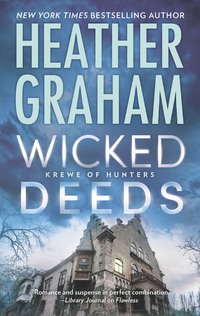Das Buch kann nicht als Datei heruntergeladen werden, kann aber in unserer App oder online auf der Website gelesen werden.
Buch lesen: "Wicked Deeds"
Nevermore...
Eager to start their life together, historian Vickie Preston and Special Agent Griffin Pryce take a detour en route to their new home in Virginia and stop for a visit in Baltimore. But their romantic weekend is interrupted when a popular author is found dead in the basement of an Edgar Allan Poe–themed restaurant. Because of the mysterious circumstances surrounding the corpse, the FBI’s Krewe of Hunters paranormal team is invited to investigate. As more bizarre deaths occur, Vickie and Griffin are drawn into a case that has disturbing echoes of Poe’s great works, bringing the horrors of his fiction to life.
The restaurant is headquarters to scholars and fans, and any of them could be a merciless killer. Except there’s also something reaching out from beyond the grave. The late, great Edgar Allan Poe himself is appearing to Vickie in dreams and visions with cryptic information about the murders. Unless they can uncover whose twisted mind is orchestrating the dramatic re-creations, Vickie and Griffin’s future as a couple might never begin...
Praise for the novels of
New York Times bestselling author
Heather Graham
“Graham is a master at world building and her latest is a thrilling, dark, and deadly tale of romantic suspense.”
—Booklist, starred review, on Haunted Destiny
“Intricate, fast-paced, and intense, this riveting thriller blends romance and suspense in perfect combination and keeps readers guessing and the tension taut until the very end.”
—Library Journal on Flawless
“Graham is the queen of romantic suspense, and her latest is proof that she deserves the title. What makes this story more fun than most is the relationship between Kieran Finnegan, who wants nothing more than family harmony and a functioning restaurant, and FBI agent Craig Fraiser, who wants justice. Sparks fly, and it’s electric.”
—RT Book Reviews on Flawless
“The Krewe is back! Graham excels at weaving history, finding the proper balance between past and present and keeping a story fresh and authentic, with Haunted Destiny being no exception. The chaos and camaraderie of the characters are captured with vivid detail, and the identity of the killer will keep you guessing until the very end.”
—RT Book Reviews on Haunted Destiny
“Riveting mystery...interesting history, sweet romance with a second chance at love.”
—Fresh Fiction on Darkest Journey
“Graham stands at the top of the romantic suspense category.”
—Publishers Weekly
“An incredible storyteller.”
—Los Angeles Daily News
Wicked Deeds
Heather Graham

For my oldest son, Jason Pozzessere,
and for Kari Stewart, a true delight to have in our lives.
Also for her folks, Kelly and Gail Stewart—
simply wonderful people.
CAST OF CHARACTERS
Griffin Pryce—special agent with the FBI’s Krewe of Hunters
Victoria (Vickie) Preston—historian and author
The Krewe of Hunters
Adam Harrison—head of the Krewe of Hunters
Jackson Crow—field director, Krewe of Hunters
Angela Hawkins—special agent, married to Jackson Crow
In Baltimore
Franklin Verne—popular bestselling author
Monica Verne—his widow
Myron Hatfield—Baltimore medical examiner
Carl Morris—detective, Baltimore Police
At the Black Bird restaurant
Gary Frampton—restaurant owner
Alice Frampton—his daughter, hostess at the restaurant
Lacey Shaw—gift shop manager
Liza Harcourt—president of the Blackbird society, a Poe appreciation group
Brent Whaley—writer, member of the Blackbird society
Alistair Malcolm—Poe expert, member of the Blackbird society
Jon Skye—waiter
At Frampton Manor
Hattie Long and Sven Moller—housekeeper and caretaker
Contents
Cover
Back Cover Text
Praise
Title Page
Dedication
CAST OF CHARACTERS
Prologue
Chapter 1
Chapter 2
Chapter 3
Chapter 4
Chapter 5
Chapter 6
Chapter 7
Chapter 8
Chapter 9
Chapter 10
Chapter 11
Chapter 12
Chapter 13
Chapter 14
Chapter 15
Chapter 16
Chapter 17
Epilogue
Copyright
Prologue
In Dreams
It was dark, and it was night, and she was following along a strange wooded path.
Vickie Preston fought against it; good things never started this way.
But she wasn’t in deep woods. She was not far from some kind of a city—she could see light through the trees.
The light seemed strange. It wasn’t the contemporary, bright luminescence of electricity that shined with such fervor that it was easily seen from space. This was different. Soft light. As if it came from candles or...gas. Gas lamps.
She had, she thought, stumbled into a different time, a different place. She made a turn, and the darkness was gone, things changing suddenly in that way of dreams; she was in a city, and it was day, late afternoon perhaps, with evening on its way.
People were rushing about, here, there and everywhere.
“Vote! Fourth Ward polls!” someone called out.
A woman with a big hoop skirt pushed by Vickie, dragging a man about by an ear. “Harold Finder! Voting is no excuse for my husband to show himself in public, drunk!” she said angrily.
Harold was twice his wife’s size, but Mrs. Finder seemed to have an exceptional hold on his ear!
They had just come from what appeared to be a tavern. Vickie looked about, wondering why no one noticed her. They were all dressed so differently; men in frock coats and waistcoats and cravats and women with their tightly corseted tops and great, billowing skirts. Granted, she was sleeping in a long white cotton gown, “puritanical,” or so Griffin had teased her.
No, no, oh, yuck! You know how I feel about our dear historical Puritans! she’d told him.
Vickie, like Griffin, had grown up in Boston. She’d become a historian and wrote nonfiction books. Despite trying to understand the very different times they had lived in, she just didn’t care much for the people who had first settled her area—they were completely intolerant.
Griffin could usually just shrug off the past; he’d been a cop when she’d first met him and he was an FBI agent now. The past mattered to him, but mostly when it helped solve crime in the present.
He’d been sleeping next to her, of course. They were on their way to Virginia from Boston, ready to start a new life. But they’d stopped in Baltimore, at a hotel... They’d laughed as they got ready for bed, he’d teased her about the nightgown...
She did not look like a Puritan!
Griffin had assured her that she wouldn’t wear the “puritanical” gown long, and she hadn’t, but then, freezing in the air-conditioning of their hotel, she’d put it back on...
She was glad, of course. Otherwise, she’d be walking stark naked around this unknown and bizarre place.
Where was she?
She turned to the doorway of the “polling place” where Harold and his wife had just departed. She could hear all manner of laughing and talking. It was definitely a tavern. Gunnar’s Place.
And there was nothing indicating Puritan Massachusetts here—she wasn’t in Massachusetts and these people certainly weren’t Puritans.
She walked in, wondering if women were welcome. It didn’t matter. No one seemed to notice her.
The place was smoky and dusty. Barmaids were hurrying about, handing out drinks. Men were being solicited for their votes.
There was a lone man seated on a wooden bench at a table, head hanging low. But when Vickie entered, he looked up, and he beckoned to her.
“I’ve been waiting for you,” he said impatiently. He stood, wavering.
He was a small man, just a little shorter than Vickie, maybe five-eight to her five-nine. His hair was dark and a curl hung over his forehead. His eyes seemed red-rimmed and sunken in his face, which was quite ashen, with a yellow pallor.
She knew him.
She’d seen his picture throughout her life; she’d loved his work. She’d loved that he’d been born in Boston—even if he had come to hate that city. There was a wonderful statue of him now, a life-size bronze figure of the writer, hurrying along with a briefcase and a raven.
She knew his face from so many pictures and images, a man haunted by demons in life, most of those demons brought about by his alcohol addiction. She’d always wondered if more knowledge during his age might have helped him; a really good therapist, a good program...
“I’m hallucinating you, you know. Delirium tremors,” he told her gravely. “But I have been waiting for you, Victoria.”
“I love your work!” Vickie said. She flushed. It was a dream, or a nightmare, and she was having a fangirl moment. She needed control and decorum.
“Yes, well, then, you are brighter than my insidious detractors,” he told her. “But here’s the thing. You must stop it. I am being used—my work, my memory. It was good—it was all good, until I came here, until I reached Baltimore. Then, they...were upon me.”
“They who?” she asked. “No one knows—it’s still a mystery.”
“They were upon me,” he repeated.
Vickie reached across the table and set her hand gently upon his. He was trembling, she realized, violently. “You’re not looking very well,” she said.
And he turned to give her a rueful smile. “No. I will not be here long, you see. But I’m glad that you made it, so glad that you’re here. It’s happening again. And you must do something. You must stop it. No one will see, because it’s much the same. Do you understand?”
“Not a word,” she assured him.
He looked across the room and seemed concerned; he stood suddenly and hurried toward the door. Vickie raced after him.
She didn’t see him at first. He was on the ground, slumped against the building. She tried to reach him, but there was already a man at his side, attempting to help him. She noted an address then, Lombard Street.
As she stood there while the one man tried to help, people continued to hurry along the street. Hawkers shouted out their wares—and their candidates. Drinks were promised for votes; there was laughter, there was a rush of music, someone playing a fiddle...
She tried to reach the fallen man, thankful that at least someone was helping him.
Across the bit of distance between them, he opened his eyes and looked at her.
“I have to go now,” he said.
“No...!”
“But I must. And you...”
“Yes?”
“You must pay attention.” He laughed softly. “Don’t let it happen again.”
“What’s that?” she asked.
A loud cawing sound seemed to rip through the air.
He looked at her sadly and said, “Quoth the raven—nevermore!”
1
“There’s been an incident, a very bizarre incident,” Jackson Crow said.
His voice over the phone as he spoke to Griffin Pryce was steady—as always. Jackson had pretty much seen it all. As field director of a special unit of the FBI—unofficially known as the Krewe of Hunters—Jackson had just about seen it all, although he’d be the first to say they’d probably never “see it all.”
The “bizarre” was usually the reason the Krewe got called in.
“What’s the incident?”
“You’ve heard of Franklin Verne?” Jackson asked.
“The writer? Yes, of course. Kind of impossible not to have heard of him—he likes to do his own commercials. He’s known for action books with shades of horror, right?”
“Yes, that’s right.”
“What about him?”
“He’s dead.”
Griffin frowned, thinking about the night before. He’d actually heard mention of Franklin Verne’s name—he and Vickie had stopped for a damned good dinner and some excellent wine at a spectacular new Baltimore restaurant. Their waiter had mentioned that Franklin Verne was in the city and they were hoping to see him in the restaurant for a meal—and, of course, an endorsement!
“Griffin?”
“Yeah. I’m thinking that you’re about to tell me how he died, and since you’re on the phone with me, and you know we’re in Baltimore, I’m assuming he died in Baltimore?”
“Yes, last night. He was found in the wine cellar of the Black Bird, a new restaurant—”
“What?” Griffin said. He knew the restaurant—pretty well! It was, in fact, the posh place where he’d taken Vickie last night.
“The Black Bird,” Jackson repeated.
“We ate there last night.”
“Oh. Well, that’s convenient. You know right where it is.”
“I do. Fell’s Point, not far from where we’re staying. You know Vickie—we found a really great old historic hotel. Blackhawk Harbor House. In fact, I’m standing outside. It’s so wonderfully old and historic, though I can’t seem to make a cell phone call from inside.” He glanced up at the building. It had been built as a hotel in the 1850s—built with concrete and care. It would probably withstand any storm. The hotel was handsome and elegant, and Griffin enjoyed it—but he still found it annoying when he couldn’t get a decent signal on his phone from his room.
“They sure weren’t expecting Franklin Verne at the restaurant,” he told Jackson. “They talked about the fact that they hoped that he would come in. His patronage would be great for business.”
“I imagine. Well, he was there—is there. Sadly, he’s dead. At the moment, they’re calling it an accidental death.”
“Okay. So. How did he die? Was it an accident, possibly...?”
“A combination of over-the-counter drugs and alcohol,” Jackson said. “That’s a preliminary—the ME, of course, will deny he suggested any true cause as of yet. You know how that works—they won’t know for certain what caused it until all the tests are back. I take it you haven’t seen any news yet?”
“Jackson, it is 7:30 a.m. This was our last weekend before settling in—me back from a long stint in Boston, and Vickie moving to a new state and an entirely new life. Hey, it was supposed to be free time. We were out late last night. Vickie is still sleeping.”
“Okay, you haven’t seen the news. Anyway, Franklin Verne used to be quite the wild man, drinking, getting rowdy with friends, playing the type of hard-core character that appears in most of his books. His wife, Monica, put a stop to it a few years back—when the doctors told her he wouldn’t make it to old age. But his body was found in a wine cellar. According to Monica, Franklin had been clean for two full years.”
“You know all this because...?” Griffin asked him.
“Because Franklin Verne gave generously to a lot of the same causes our own Adam Harrison holds so dear,” Jackson said.
Adam Harrison was their senior advisor—he was, in fact, the creator of the Krewe, and a man with a phenomenal ability to put the right people together with the right situation.
“Naturally,” Jackson continued, “he’s quite good friends with Monica, so... Well, there you have it. He’ll wrangle us an invitation into the investigation eventually—you know him and his abilities with local police.” Jackson hesitated a minute. “Even if we wind up having to tell Monica she lost her husband because he slipped back into addiction, she’ll have the truth of the situation. For the moment, I need you to go make nice with Detective Carl Morris.”
“Carl Morris, sure,” Griffin said.
So much for the incredible plans he’d had with Vickie for the day!
“Addiction, a friend, temptation... It could have been an accident,” Griffin said.
“Yes. Except that none of the waitstaff saw him in the restaurant, much less down in the wine cellar. And, as I said, Monica—who claims she really knew her husband—is calling it murder.”
“Ah. Okay, are you coming up?” Griffin asked Jackson. Krewe headquarters was only about an hour and a half—two hours at most—from Baltimore, even counting Beltway traffic.
“Maybe, but Adam wants to move delicately with this. We’re not invited in yet—Franklin Verne’s death isn’t even considered to be a murder at the moment. But of course, the way the man died, there has to be an autopsy and an investigation. Get started for me, and then give me a call. Let me know what you think.”
“All right. When did this happen?”
“He was found about an hour ago. Adam got the call from Monica immediately after she was visited by the police and informed that her husband was dead. If you head in quickly, you’ll see the body in situ. Oh, and one more thing.”
“What’s that?”
“Well, it is Baltimore, and Poe is buried there, and, hell, the name of the restaurant isn’t Raven, but it is Black Bird...”
“What?”
“He was found gripping a little bird. Yes, a raven, of course. It’s the kind you can find just about anywhere they have Poe souvenirs. Cheap, plastic, black—on a little pedestal with its wings out, beak open...and the word nevermore written on the base.”
“Like you said, you can buy those souvenirs anywhere.”
“Yep. And, sorry. Just one more thing again.”
“What’s that?”
“He was surrounded by three dead blackbirds. Naturally, of course, no one can figure out how Franklin Verne—or the birds—got into the wine cellar.”
* * *
Vickie opened her eyes.
For a moment, she was disoriented.
She wasn’t at all sure where she was!
And then she realized that Griffin was there, looking down at her with concern. A half grin curled his lips, though that grin was far more rueful than amused.
Grim, even.
“A nightmare?” he asked her gently, a trace of worry crossing his bronzed face. There wasn’t a reason for her to be having nightmares—at the moment. The Krewe cases with which she’d been involved had come to their conclusions.
She was in the wonderful hotel in Baltimore’s Fell’s Point where she had enthusiastically suggested they stay on their trip from Boston to Arlington, Virginia—even though they hadn’t really needed to make it an overnight trip, much less a weekend one.
But she and Griffin had wanted time together. Fun time, sightseeing, before Griffin reported back to headquarters; Vickie was preparing to enter the FBI’s training academy at Quantico.
Eventually, they’d both be working out of the main special offices of the Krewe of Hunters unit. But for now, Griffin would be getting back to work, they’d both be settling in to living together—and Vickie would be starting up with the next class for twenty weeks of training that would lead to her graduation and an official position with the Krewe.
Vickie could have told Griffin about the dream. The Krewe were more than simply dedicated and well-trained agents. They had been gathered together carefully because they all had unique abilities, the center of those abilities being that they could communicate with the dead.
When the dead chose, of course.
She and Griffin had both known for years just what the other was capable of. While they had only rekindled their relationship recently, they had first met almost a decade ago—when a serial killer had nearly taken Vickie’s life. It had been a ghost, the older brother of the child she was babysitting, who had saved her by sending her running out of the house to safety, straight toward a young Officer Pryce. He’d been a cop before becoming an agent, though he had now been with the Krewe of Hunters for quite some time. He’d always known that he wanted to be in law enforcement.
It wasn’t that way for Vickie.
She loved history. She’d been a guide, leading youth-group tours as a historian, and she was an author of history books. She was proud to say that she was good at it—the most important reviews to her were the ones that said she had a way of making history fun for the reader.
It was only the cases with which she had recently become involved that had made her want to veer in a new direction. Not a change—an addition. There had been a case in which an incarcerated serial killer had managed to reach out to strike again, and then another where modern-day Satanists had tried to bring the devil back to Massachusetts.
She was now determined to do her best to become an agent herself, and it was a decision with which she was really pleased. It was odd to realize that she had once been embarrassed by her secret talent—the ability to speak with the dead. She hadn’t wanted to admit that it could be real. But she’d learned recently that her so-called curse allowed her to actually make a difference. She might have the ability to help in more bizarre cases—to save lives. And that mattered. To that end, she’d applied for and been accepted to the academy at Quantico. The Krewe might be a special unit, but even so, the agents were required to go through the academy. Vickie had passed the necessary tests on paper and made it through the grueling physical regimen necessary to become an agent.
Griffin already had an apartment in a wonderful old row house in Alexandria. For him, it wasn’t a move—just a return to his home of the past several years. He had only been back in Boston—where he and Vickie both were born and raised—on assignment.
Vickie had gone to college at NYU and then lived in New York for several years, but never farther south.
It was, she’d assured him, exciting to move.
But she was aware that Griffin believed it had to be a tug on her heartstrings as well—she was leaving a lot behind.
And she was. But she was also happy to be moving forward.
“A nightmare?” he repeated, and the note of worry seemed higher.
She smiled, staring into his dark eyes. Griffin was fine with her decision to become an agent; the Krewe was composed of both men and women, and he knew women were every bit as efficient and excellent as agents as men.
It was just her—but of course, he loved her. It wasn’t going to be easy for him to accept her walking into the same danger he did daily. He would, however, get used to it—and she loved him all the more for that fact.
“No, not a nightmare!” she told him. He far too quickly became concerned for her. All it had been was a bizarre dream. It might well have been due to the way they’d overindulged in some delicious blue crabs at dinner last night.
She would stay mum. For the moment. After all, she was in Baltimore. Edgar Allan Poe was buried here; he’d died here. Having dreams about him didn’t seem the least bit strange, actually.
But for the moment...
“It was a dream, and rather a cool one. I was walking around Baltimore...”
“We’re in Baltimore, so that seems...normal, maybe?”
She grinned, rolling onto an elbow to better face him—he’d already gotten up and showered and dressed for the day. He was an early riser—alert and ready to face the world as soon as he opened his eyes.
Vickie...not so much! But she was getting used to early mornings.
“Perfectly normal,” she told him. “It wasn’t a nightmare. It was just a dream. About beautiful old Baltimore—hey, it’s an important city, right? And we are going to go and do some cool things today, aren’t we?”
“Absolutely,” he promised. “Fort McHenry, the Inner Harbor, Federal Hill—”
“Don’t forget the aquarium!” she said.
“I wouldn’t dream of it. But I thought we might want a full day for that. We can do whatever you choose, my love. Anything you would like.”
“You’ve done it all too many times before?” she asked him.
He laughed. “No. I mean, I have done it all before, but not with you, so it’s as if it’s the first time, right?”
“That is an incredibly good suck-up line if I have ever heard one!” she assured him.
She thought that the line might take them somewhere, but he smiled and stepped away from the bed.
“I just have a couple of hours of work first,” he said.
“What?”
“Work. But there’s not much involved at the moment, and not much I can do.” He added quietly, “Franklin Verne—you know who he is?”
“Yep. I’m living and breathing and have ears and eyes. You can’t miss him. What about him?”
“He died last night.”
“Oh, that’s too bad—terribly sad! I’ve seen him speak. I mean, I write nonfiction and he writes fiction, but I’ve been at a number of conferences where he’s been a speaker on a panel. He was charming and very funny...helpful, giving. He’s actually written some historical fiction, and while Verne tended toward horror—some action, some sci-fi and some mystery—he was a wonderful researcher as well.”
“Always the writer!” he teased.
“That’s not going to be a problem, is it?” She’d spoken with other agents and she believed that—assuming she did make it through the academy—she’d still be welcome to write on her own time. It seemed that Krewe agents were, in fact, encouraged to keep up with any previous pursuits.
“It’s fine!” he assured her quickly.
“So what happened to Franklin Verne? I know that he was ill a few years ago—in fact, he joked about it sometimes when he spoke, saying that his wife taught him how to have fun and not be totally boring without a dip in a whiskey vat.”
“Yes, I had heard that he was supposedly as clean as a newborn babe.”
“Supposedly?”
“He was found dead in a wine cellar.”
“In a wine cellar—he didn’t have a wine cellar. I don’t think he even drank wine. When he did drink.”
“Not his wine cellar. But how do you know he didn’t have a wine cellar?”
“He was very open about his health problems, about his wild days—and his love for his wife,” Vickie said. “So, if not his own wine cellar—where then?”
“The Black Bird.”
“What?”
“Amazing. That was my exact reaction when Jackson told me. Want to come with me? I’m on my way there now. Heading off to kowtow to a local cop named Carl Morris.”
Vickie rolled out of bed. “Ten minutes,” she told him.
He nodded; he knew she was telling the truth.
* * *
Vickie and Griffin had both thoroughly enjoyed the Black Bird the night before; the service had been wonderful and the food had been delicious.
Vickie had especially like the decor; the building was 1820s Federal style, and the restaurant had the first two floors and the basement of the building while the remaining three floors above were given over to office space. Upon entering a long hall of a foyer with exposed brick walls and plush red carpeting, you came to the hostess stand. From there it went through to the bar area.
The bar was lined with portraits of Poe and his family; there were framed posters of quotations and more, all having to do with Edgar Allan Poe.
Stairs led from behind the bar to several sections of seats and a few party rooms of various sizes. The main dining room was the first floor, and tables and booths were surrounded by bookshelves.
Of course, not even the master could have written enough to fill the restaurant’s shelves; it was an eclectic mix of secondhand novels. The venue had charmingly been planned on the concept that every diner was welcome to take a book, and, naturally, you were welcome to leave a book or books as well.
New editions of Poe books were sold in the gift shop, which was conveniently on the way out, at the back of the restaurant. Of course, one could leave through the front door, but the bookshop was like a minimuseum, and Vickie sincerely doubted that many people ignored it. Their waiter—he’d introduced himself as Jon—told them that though the restaurant was comparatively new, they attracted a lot of local, repeat clientele, for which they were very grateful. But locals didn’t tend to shop for souvenirs, unless they were entertaining out-of-town friends. Since they were happily playing tourist, Vickie and Griffin made sure to visit the shop. Lacey Shaw, the woman working the little boutique, was a bit of a Poe aficionado, and she assured them that even the locals loved to come in and chat.
And their waiter was also quite the enthusiast. “Seriously, poor Poe was much maligned in life, but most of the time, the people who wrote about him were seriously jealous competitors, so of course they tried to make him out to be nothing but a drunk with delusions of grandeur. In truth? He was brilliant. You do know that we credit him with the creation of the modern detective novel? ‘The Murders in the Rue Morgue’! What an imagination the man had!” Jon had told them, eyes bright with his admiration. He might be a waiter there, but he truly loved the works of the man and had studied his life.
“I promise you, we’ll not argue Poe’s brilliance,” Griffin had assured him.
Jon had gone on, “But people love the restaurant because of the library. It’s not a new idea but what a great one—bring a book, take a book! Or just take a book. Well, okay—buy a shiny new one in the gift shop, too. I love working here! Gary Frampton—the owner—is a wonderful man. I’m crazy about him. Alice—the lovely girl with the long blond hair who greeted you as a hostess tonight—is his daughter.”
It wasn’t “lovely Alice” who met them then, though, by light of the next day.
It was an officer in uniform.
Griffin produced his credentials, and the officer gruffly told him to go on downstairs to the wine cellar.
The stairs were brick, as old as the building, but well maintained. As they descended, the air got cooler. The cellar was climate controlled but obviously didn’t need much help. It was stone, deep in the ground near the harbor, and naturally protected from the heat of a mid-Atlantic summer.
A tall, slim man who somewhat reminded Vickie of Lurch from The Addams Family was standing quietly in the center of the main room. Crime-scene techs—easily identifiable by their jackets—were moving about, collecting what evidence could be found.








